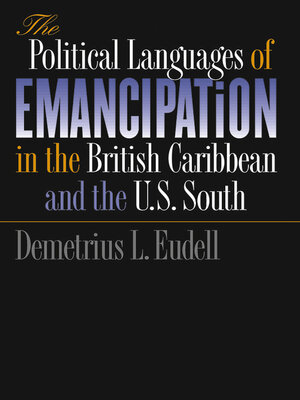The Political Languages of Emancipation in the British Caribbean and the U.S. South
ebook
By Demetrius L. Eudell

Sign up to save your library
With an OverDrive account, you can save your favorite libraries for at-a-glance information about availability. Find out more about OverDrive accounts.
Find this title in Libby, the library reading app by OverDrive.



Search for a digital library with this title
Title found at these libraries:
| Library Name | Distance |
|---|---|
| Loading... |
This comparative study examines the emancipation process in the British Caribbean, particularly Jamaica, during the 1830s and in the United States, particularly South Carolina, during the 1860s. Analyzing the intellectual and ideological foundations of postslavery Anglo-America, Demetrius Eudell explores how former slaves, former slaveholders, and their societies' central governments understood and discussed slavery, emancipation, and the transition between the two.
Eudell investigates the public policies — which addressed issues of labor control, access to land, and the general social behaviors of former slaves — used to execute emancipation. In both regions, government-appointed officials (special magistrates in Jamaica and agents of the Freedmen’s Bureau in South Carolina) were crucial in implementing these policies. While many former slaves were fighting for the right to be paid for their labor and to own land, many officials came to view their role as part of a new civilizing mission whose goal was to eradicate the psychic damage supposedly caused by slavery.
Eudell concludes by examining the 1865 Morant Bay rebellion in Jamaica and the retreat from Reconstruction in South Carolina, part of the larger movement of Redemption that occurred in 1877. Both of these occurrences represented the incomplete victory of emancipation, Eudell argues, and should provoke scholarly questions regarding the persistent thesis of U.S. exceptionalism.
Eudell investigates the public policies — which addressed issues of labor control, access to land, and the general social behaviors of former slaves — used to execute emancipation. In both regions, government-appointed officials (special magistrates in Jamaica and agents of the Freedmen’s Bureau in South Carolina) were crucial in implementing these policies. While many former slaves were fighting for the right to be paid for their labor and to own land, many officials came to view their role as part of a new civilizing mission whose goal was to eradicate the psychic damage supposedly caused by slavery.
Eudell concludes by examining the 1865 Morant Bay rebellion in Jamaica and the retreat from Reconstruction in South Carolina, part of the larger movement of Redemption that occurred in 1877. Both of these occurrences represented the incomplete victory of emancipation, Eudell argues, and should provoke scholarly questions regarding the persistent thesis of U.S. exceptionalism.







